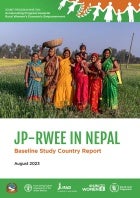Date:
These key findings will be used as the baseline for measuring the extent to which this programme will contribute to advancing gender equality and women’s empowerment in Nepal. The programme (second phase) is being jointly implemented by UN Women (lead), IFAD, FAO and WFP in close collaboration with all three tiers of governments.
Date:
This brief is guided by the UN Women-ILO Joint Programme tool, “How to Assess Fiscal Stimulus Packages from a Gender Equality Perspective” (hereafter called the ‘gender assessment tool’) and is part of a larger assessment of Nepal’s macroeconomic policy response to the COVID-19 pandemic.
Date:
This brief, which is an outcome of the UN Women-ILO Joint Programme, argues that macroeconomic policies play a key role in promoting the distribution of income and access to decent work opportunities for women. Investments in care services allow for the redistribution and reduction of unpaid care work and address time poverty
Date:
Key insights highlight how disasters amplify gender-based violence, and livelihood challenges, and hinder access to essential services. The document advocates for GEDSI-responsive planning, budgeting, and coordination within DRR frameworks, stressing the importance of inclusive approaches, stakeholder engagement, and robust monitoring for effective implementation.
Date:
This brief is developed to guide the development of injects for gender-responsive services/interventions for earthquakes and urban flood preparedness, describing disaster events, their impacts and response through a GESI perspective.
Date:
This policy brief addresses some of the key factors and measures to be adopted in a Post-Crisis GESI Analysis, to effectively address a crisis’s differential impacts on gender, social disability, and age. The recommendations are intended to support analyses undertaken immediately after a crisis, to represent structural inequalities...
Date:
This guideline has been developed to inform on its scope, procedure, implementation and reporting, under the technical guidance of UN Women Nepal, financial support from the European Union Humanitarian Aid and support from UNDP, UNICEF.
Date:
The Policy Brief draws from GEDSI Analysis conducted in Lumbini, Sudurpashchim and Karnali Provinces to identify opportunities for municipal governments and development partners to strengthen disaster risk reduction efforts and urban resilience by more comprehensively meeting the needs of women and excluded groups.
Date:
This is a brief of the highlights of Governance of Labour Migration in South and Southeast Asia (GOALS) which was jointly implemented by UN Women, ILO, and IOM with support from Swiss Development and Cooperation (SDC) from August 2020 to January 2024.
Date:
The manual is meant to support primarily policymakers, practitioners and service providers who can advocate for and enhance a whole-of-government and whole-of-society approach in developing and implementing reintegration policies and practices in a coordinated manner.
Date:
he NAP II has concrete and immediate action to provide conflict-affected with a recognition that they are conflict victims with rights to reparation and justice from the state, along with dedicated support, services and resources that allow them to rebuild their lives with dignity.
Date:
The project took place from 2022-2023 and was funded by the UN Women Regional Office for Asia—Pacific. The legal needs survey and associated knowledge products were generously supported by the Government of Sweden and the UN Women Centre of Excellence for Gender Equality in Seoul, Republic of Korea.
Date:
A set of recommendations are presented at the end for the systematic collection and management of migration data to support gender-responsive policy formulation and programming.
Date:
The audit was conducted to understand specific safety concerns faced by women and girls, particularly in disaster preparedness and response, including the COVID-19 pandemic.
Date:
The analysis identified trends from discourse data generated across social media platforms and search engines. In particular, big data on people’s search behaviour on VAWG-related topics (both before the onset of the pandemic and since) were considered.
Date:
This policy brief is intended to serve as a knowledge resource for UN Women, the Government of Nepal, international development partners, civil society, and the private sector to work towards inclusive Micro, Small, and Medium-sized Enterprise (MSME) sector growth in Nepal.
Date:
This policy brief is intended to serve as a knowledge resource for UN Women, the Government of Nepal, international development partners, civil society, and the private sector to accelerate the financial inclusion of women in Nepal.
Date:
This policy brief is intended to serve as a knowledge resource for UN Women, the Government of Nepal, international development partners and civil society to work towards gender-responsive and socially inclusive social protection in Nepal.
Date:
The policy brief series is intended to serve as a knowledge resource for UN Women, the Government of Nepal, international development partners, civil society, and the private sector to work toward gender-responsive and inclusive post-pandemic recovery in Nepal.
Date:
A handbook on gender-responsive police services, published by UN Women under the framework of the UN Joint Global Programme on Essential Services, in collaboration with UNODC and the IAWP, has been published in the Nepali language.


![[cover]](/sites/default/files/styles/search_image_140px/public/2024-06/np-c961-policy-brief-tool-1-5-960px.jpg?itok=jMsLFzhi)
![[cover]](/sites/default/files/styles/search_image_140px/public/2024-06/np-c960-policy-brief-20230912-960px.jpg?itok=OJv8E8Ix)
![[cover]](/sites/default/files/styles/search_image_140px/public/2024-06/np-c949-05-gender-equality-disability-and-social-960px.jpg?itok=h06PBdVx)
![[cover]](/sites/default/files/styles/search_image_140px/public/2024-06/np-c948-04-gender-responsive-costing-for-earthquakes-960px.jpg?itok=mc9kJWZC)
![[cover]](/sites/default/files/styles/search_image_140px/public/2024-06/np-c947-03-unwomen-policy-brief-gedsi-post-crisis-202-960px.jpg?itok=G_7Qks6P)
![[cover]](/sites/default/files/styles/search_image_140px/public/2024-06/np-c946-02-gedsi-responsive-drr-audit-guidline-2080-960px.jpg?itok=zzicLbBB)
![[cover]](/sites/default/files/styles/search_image_140px/public/2024-06/bd-c945-1-policy-brief-gedsi-linking-drrm-20-en-960px.jpg?itok=kTtTG-oO)
![[cover]](/sites/default/files/styles/search_image_140px/public/2024-05/bd-c899-goals-highlights-960px.jpg?itok=3Ih8ksJA)
![[cover]](/sites/default/files/styles/search_image_140px/public/2024-02/bd-c652-pub2023027-el-regional-reintegration-960px.jpg?itok=5IyTMPC7)
![[cover]](/sites/default/files/styles/search_image_140px/public/2023-11/np-english-nap-2023-960px.jpg?itok=TZapkFF9)
![[cover]](/sites/default/files/styles/search_image_140px/public/2023-08/01-summary-kp2-d4-r02s-960px.jpg?itok=F-4YDrN4)
![[cover]](/sites/default/files/styles/search_image_140px/public/2023-08/np-2023aug7_statistical-brief-960px.jpg?itok=F97VrRbq)
![[cover]](/sites/default/files/styles/search_image_140px/public/2023-08/np-WSAR-Policy-Brief-Final-2023Aug3-960px.jpg?itok=gKbzTmmh)
![[cover]](/sites/default/files/styles/search_image_140px/public/2023-08/ap-covid-19-and-vaw-study-research-960px.jpg?itok=Yoje0uVR)
![[cover]](/sites/default/files/styles/search_image_140px/public/2023-07/np-towards-inclusive-msme-sector-growth-in-nepal-960px.jpg?itok=ZKxOc1N5)
![[cover]](/sites/default/files/styles/search_image_140px/public/2023-07/np-accelerating-the-financial-inclusion-of-women-960px.jpg?itok=krBbonZ_)
![[cover]](/sites/default/files/styles/search_image_140px/public/2023-07/np-moving-towards-gender-responsive-and-socially-960px.jpg?itok=BPLmlIOP)
![[cover]](/sites/default/files/styles/search_image_140px/public/2023-07/np-towards-gender-responsive-and-inclusive-960px.jpg?itok=29ZFbjul)
![[cover]](/sites/default/files/styles/search_image_140px/public/2023-07/np-police-handbook-nepali-960px.jpg?itok=LSyJdhd7)